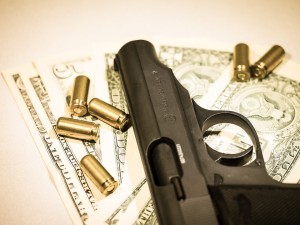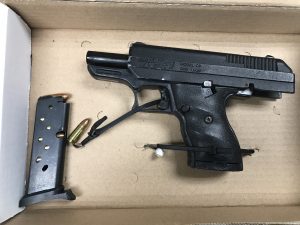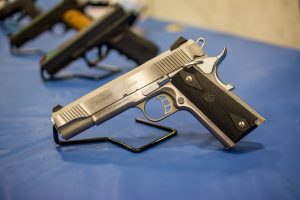 The U.S. Attorney’s office recently announced that a 31-year-old Montgomery County man has been arrested and charged with being a felon in possession of a firearm, distribution of controlled substances and possession of a firearm in furtherance of a drug trafficking crime. A criminal complaint was filed against the defendant on March 4, 2022 and he was arrested on March 7. The Germantown man was ordered to be held without bail at his detention hearing in the Greenbelt federal courthouse two days after his arrest. According to the sworn affidavit in support of the criminal complaint, the defendant was identified as a suspected narcotics and firearms dealer. In February of this year the defendant sold guns and drugs to an undercover law enforcement officer three times in Montgomery County. The sales allegedly included more than 45 grams of crack cocaine, gel caps containing heroin and fentanyl and numerous firearms including multiple ghost guns. The term ghost gun is used to describe any privately made firearm that does not have a serial number and cannot be individually identified or traced. These weapons have become a point of focus for law enforcement over the last few years, and will continue to be a major issue for state and federal legislators.
The U.S. Attorney’s office recently announced that a 31-year-old Montgomery County man has been arrested and charged with being a felon in possession of a firearm, distribution of controlled substances and possession of a firearm in furtherance of a drug trafficking crime. A criminal complaint was filed against the defendant on March 4, 2022 and he was arrested on March 7. The Germantown man was ordered to be held without bail at his detention hearing in the Greenbelt federal courthouse two days after his arrest. According to the sworn affidavit in support of the criminal complaint, the defendant was identified as a suspected narcotics and firearms dealer. In February of this year the defendant sold guns and drugs to an undercover law enforcement officer three times in Montgomery County. The sales allegedly included more than 45 grams of crack cocaine, gel caps containing heroin and fentanyl and numerous firearms including multiple ghost guns. The term ghost gun is used to describe any privately made firearm that does not have a serial number and cannot be individually identified or traced. These weapons have become a point of focus for law enforcement over the last few years, and will continue to be a major issue for state and federal legislators.
In addition to the three alleged sales in February, the defendant and the undercover law enforcement officer also met a fourth time. During this meeting the defendant allegedly sold the cop three fully assembled Glock style handguns for a total of $3,000. The sale was observed by additional law enforcement surveillance units, and memorialized by several calls and text messages. In addition to the four meetings, the defendant also apparently admitted to the undercover officer that he could not legally purchase a firearm due to a previous felony conviction. The defendant faces up to 10 years in prison for felon in possession of a firearm and up to 20 years for distribution of controlled substances. He also faces a mandatory minimum sentence of 5 years for possession of a firearm in furtherance of a drug trafficking crime. This federal offense is almost identical to the Maryland state law that prohibits the possession of a firearm in a drug trafficking crime. The government is not required to prove that the firearm was actually used or brandished during the drug trafficking crime. Rather, all that is required is for the government to prove a nexus or connection between the gun and the drugs. Courts have consistently held that drug dealers possess firearms to protect themselves against theft and robbery, which makes it difficult for the defense to argue that the guns and drugs are not related. A drug trafficking crime includes all felony drug charges such as possession with intent to distribute, manufacturing and distribution. Despite the use of the term trafficking, there is no requirement that the government prove the defendant was a volume dealer or drug kingpin for this law to apply.
The Blog will continue to follow this case and many other federal gun and drug prosecutions. We may post a follow up article on this case depending on the outcome so stay tuned. If you or a loved one has been charged or is being investigated by the ATF, FBI, DEA or any other federal or state law enforcement agency contact Benjamin Herbst anytime for a free consultation. Benjamin is a Maryland criminal defense lawyer who specializes in drug crimes and weapons charges, and is available 7 days a week to explain what defenses may be available in your case. He handles charges including wear transport or carry of a handgun and illegal possession of a regulated firearm, and practices in all state and federal courts in Maryland. Benjamin can be reached at 410-207-2598 and is also licensed to practice law in the state of Florida.
 Criminal Defense Lawyer Blog
Criminal Defense Lawyer Blog






